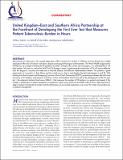Files in this item
United Kingdom–East and Southern Africa partnership at the forefront of developing first ever test that measures patient tuberculosis burden in hours
Item metadata
| dc.contributor.author | Sabiiti, Wilber | |
| dc.contributor.author | MBLA development stakeholders | |
| dc.date.accessioned | 2019-03-25T10:30:06Z | |
| dc.date.available | 2019-03-25T10:30:06Z | |
| dc.date.issued | 2019-03 | |
| dc.identifier | 257743749 | |
| dc.identifier | b2ad83af-0c20-4f94-bc98-6df011fb58fa | |
| dc.identifier.citation | Sabiiti , W & MBLA development stakeholders 2019 , ' United Kingdom–East and Southern Africa partnership at the forefront of developing first ever test that measures patient tuberculosis burden in hours ' , East Africa Science , vol. 1 , no. 1 , pp. 3-8 . https://doi.org/10.24248/EASci-D-18-00008 | en |
| dc.identifier.other | ORCID: /0000-0002-4742-2791/work/60196333 | |
| dc.identifier.uri | https://hdl.handle.net/10023/17362 | |
| dc.description | EDCTP for funding the development and trialling of the Molecular bacterial load assay test. GCRF, SCF, PanACEA and University of St Andrews School of Medicine for funding the MBLA stakeholders conference. We acknowledge funding from European and Developing countries Clinical Trials Partnership for funding the development and trialling of the Molecular bacterial load assay test. Funding from Scottish Funding Council – Global Challenges Research Fund, Pan-African Consortium for Evaluation of anti-tuberculosis Antibiotics and University of St Andrews School of Medicine for made the MBLA stakeholders conference possible. | en |
| dc.description.abstract | Mycobacterium tuberculosis has caused tuberculosis (TB) in humans for at least 3 millennia, but the disease has evaded eradication efforts by all human civilisations despite promising technological advancements. The World Health Organization (WHO) has set a target of ending the TB epidemic by 2035. Going by the current rate of progress, it is estimated that it will take another 160 years to realise the WHO End TB Strategy’s target. Accelerating the eradication of TB will require effective tools for diagnosis, vaccines and medicines to treat the disease, and efficient implementation thereof. This presents a great opportunity for innovators in East Africa and the world over to chip in and develop the best technologies to end TB. With funding from the European and Developing Countries Clinical Trials Partnership (EDCTP), partnerships between the UK-based University of St Andrews and research institutions in East and Southern Africa have led to the development of the first ever test – the molecular bacterial load assay (MBLA) – that measures the number of TB bacteria in a patient and reveals if this number is declining as a patient progresses on treatment. Initial assay results are available within 4 hours. Real-time knowledge of patient mycobacterial burden and the effectiveness of prescribed medications are crucial for timely clinical decisions on patient management. | |
| dc.format.extent | 6 | |
| dc.format.extent | 5913939 | |
| dc.language.iso | eng | |
| dc.relation.ispartof | East Africa Science | en |
| dc.subject | Tuberculosis | en |
| dc.subject | Molecular bacterial load assay | en |
| dc.subject | Treatment monitoring | en |
| dc.subject | Partnership to accelerate innovation | en |
| dc.subject | RA0421 Public health. Hygiene. Preventive Medicine | en |
| dc.subject | T-NDAS | en |
| dc.subject | SDG 3 - Good Health and Well-being | en |
| dc.subject.lcc | RA0421 | en |
| dc.title | United Kingdom–East and Southern Africa partnership at the forefront of developing first ever test that measures patient tuberculosis burden in hours | en |
| dc.type | Journal article | en |
| dc.contributor.sponsor | Scottish Funding Council | en |
| dc.contributor.institution | University of St Andrews. Infection and Global Health Division | en |
| dc.contributor.institution | University of St Andrews. School of Medicine | en |
| dc.identifier.doi | 10.24248/EASci-D-18-00008 | |
| dc.description.status | Peer reviewed | en |
| dc.identifier.url | https://www.editorialmanager.com/easci/Default.aspx?pg=login.asp&username=&a=r | en |
| dc.identifier.url | https://www.eahealth.org/sites/www.eahealth.org/files/content/attachments/2019-03-22/EASci-v1n1-book-190322-FINAL-4_0.pdf | en |
| dc.identifier.grantnumber | SFC/AN/12/2017 | en |
This item appears in the following Collection(s)
Items in the St Andrews Research Repository are protected by copyright, with all rights reserved, unless otherwise indicated.

